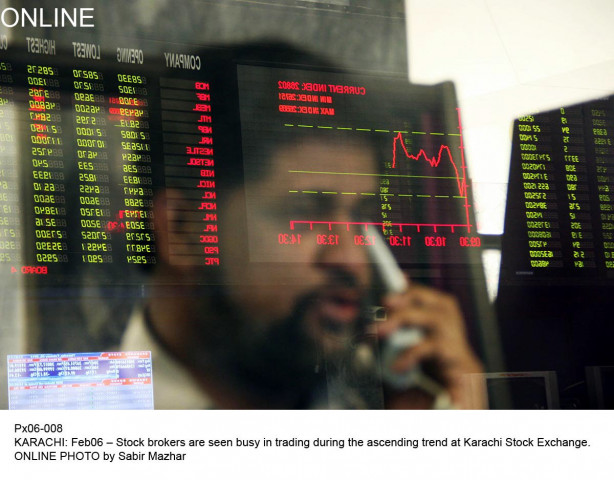Pakistan retains status in MSCI EM Index
Retains all three large and mid-cap Pakistani stocks in its Global Standard Indexes

KSE 100 index. PHOTO: ONLINE
The Morgan Stanley Capital International (MSCI) – the indexes service and analytics provider – has retained all the three large and mid-cap Pakistani stocks ie MCB Bank (MCB), Oil and Gas Development Company (OGDC) and Habib Bank Limited (HBL) in its Global Standard Indexes (GSI), according to the review results.
The decision would help Pakistan (Pakistan Stock Exchange/PSX) win global stock market investors' confidence to invest in listed firms at PSX, as they follow MSCI decisions to invest or divest at global markets. These foreign investors have around $2 trillion investment in hand.
There are only three Pakistani large and mid-cap stocks in GSI, which is the minimum number of stocks to remain part of MSCI EM Index. A single deletion from among the three would have resulted into downgrading Pakistan to the Frontier Market Index, while at least two stocks were at risk of getting deleted by one criteria or the other.
"The buffer and index continuity rules (which relaxed the criteria for the time being considering the coronavirus impact) have apparently saved Pakistan in MSCI Emerging Market Index," Arif Habib Limited Head of Research Tahir Abbas told The Express Tribune in post-review comments.
"Pakistan's weight in MSCI EM main index is expected to be 0.026%," he said.
Earlier, assuming the cut-off date of April 28, 2020 for the review, only OGDC had fulfilled the total market capitalisation criteria of $1.53 billion, while MCB and HBL were short by $374 million and $615 million, respectively. Whereas on the basis of free-float market cap, none of the three constituents met the required criteria of $766 million, he said in a commentary before the review.
However, given applicability of buffer rule (two-third of benchmark criteria), MCB was expected to be eligible on total market cap while HBL had still missed the target by $104 million. Moreover, for free-float market cap, MCB had appeared eligible while OGDC and HBL remained short by $137 million and $144 million, respectively, he added.
The three stocks had missed such criteria following their market capitalisation (total value of listed firms as per their share prices on cut-off date) dropped in the aftermath of panic sales by investors under the lockdown imposed to contain the coronavirus pandemic late in March in Pakistan.
"Pakistan’s equity market…recorded a decline of 17.9% or 7,263 points (USD based negative return of 20.8%) since the last MSCI quarterly review back in February 2020," Abbas said.
Two additions, deletions
However, MSCI has added two Pakistani stocks and deleted another two in its Global Small Cap Indexes.
Accordingly, the small cap indexes would welcome Mari Petroleum and Pakistan Petroleum and farewell Nishat Mills and Sui Northern Gas Pipeline Limited.
The changes will take place at close of May 29, 2020, MSCI announced.
The total number of Pakistani constituents in the small cap indexes stands at 16, including Bank Alfalah, Engro Corporation, Engro Fertilisers, Fauji Fertiliser Company, Hub Power Company, Indus Motor, Lucky Cement, Mari Petroleum, Millat Tractors, National Bank of Pakistan, Packages Limited, Pakistan Oilfields Limited, Pakistan Petroleum, Pakistan State Oil, The Searle and United Bank Limited.
Pakistan was reclassified into the MSCI EM Index from the FM Index in May 2017 after a gap of nine years. Earlier, the country was downgraded to FM Index in 2008 after the PSX (previously known as Karachi Stock Exchange) virtually suspended trading for quite a long period to avoid harsh selling.


















COMMENTS
Comments are moderated and generally will be posted if they are on-topic and not abusive.
For more information, please see our Comments FAQ